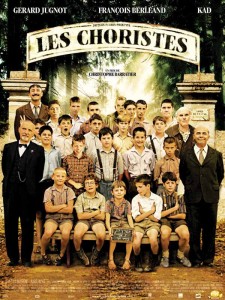All my life I have been surrounded by music, and I’ve loved every second of it. Growing up exposed to music, I saw the world in a different way; instead of simply seeing a clock’s pendulum swing back in forth, I would match the march of the seconds to the rhythmic flickering of the router that sat next to the television. For me, music provided another unique lens through which to see the world—and with it, a different outlet by which to express myself. With music, I’ve been able to travel the world with an orchestra and in every place I went to, I learned that I could use my cello as common ground to relate to anyone I met. Music helps create an invisible connection with anyone who becomes involved with it, and I’m blessed to have been apart of this world since a very young age. A similar process occurs in the life of Clement Mathieu, a newly arrived teacher at a rigidly administered boys’ boarding school, in the film Les Choristes. In this movie Mathieu comes face to face with the difficulty of his students’ lives and works to positively affect them through music. Mathieu uses this method to relate to the children and uses it in place of dealing out harsh consequences when the children step out of line, which is normalized by the school’s cruel principal, Rachin. Mathieu managed to change the children so dramatically because he was able to change them from within, deeply impacting them by instilling them with a new outlook and teaching them that hard work can and will pay off. By creating a common interest in singing, Mathieu creates solidarity with the students by showing them a unified goal.
By creating a common interest in singing, Mathieu creates solidarity with the students by showing them a unified goal.
While I’d love to attribute the change in the boys just to the magic of music, I can’t rightly give full credit to their singing. The catalyst for their change comes from the empathy, humor, compassion and interest of Mathieu – all of which culminates into an affirmation of the student’s dignity as a person. When entering the school, Mathieu instantly saw the destruction and pain in the environment and saw his position as a teacher as a way to ameliorate the boys’ lives. Through relating to the boys, making them laugh, showing them concern, and simply giving them attention, Mathieu caught the a boys’ interest and showed them to concentrate their energy and focus on their dreams. Beyond that, he showed an overwhelming love and care for all the children, and they responded to that.
The catalyst for the students’ change comes from the empathy, humor, compassion and interest of Mathieu – all of which culminates into an affirmation of the student’s dignity as a person.
What I find most inspiring about this movie is the theme of loving without discrimination, as Mathieu shows. No matter if the boy was shy or deemed “useless” like Pepinot, Mathieu showed compassion and found a spot for them— in Pepinot’s case, he became his helper. This approach shows how Mathieu not only loves each and every single student, but also how this helps the students realize their own dignity as a human being, deserving of fair treatment and compassion. In this modern day where our population is as diverse as ever, we can’t forget this lesson. Though people around us may not necessarily possess the same beliefs or morals as we do, that doesn’t mean they’re not worth helping when they are in need.
Many of us grow up with the ideal of unbiased and unconditional love when we’re little, but so often abandon this view as we mature or are persuaded otherwise by the people around us. To promote human dignity for all youth, or even all people, people need to see past their own prejudices and their own opinions to go on to make greater change. This was the critical difference between Mathieu and Rachin. While Rachin had a vision of the ideal and tried punishing all that didn’t fit in his “ideal” dream, Mathieu surpassed that narrow vision and cared for everyone – no matter how different that child was. We need to embody Mathieu’s way of thinking and try doing the same. Love is so often used as an umbrella term for so many things – compassion, empathy, warmth, etc, – but what I know it as is something that bonds people together to do spectacular things. Mathieu was able to show love, and everything under that umbrella term, to his students and in return he helped create solidarity and have the passion to fight for the common good. “Love All. Hatred for None.” – that’s how we protect the human experience and dignity of all people.
Michael Wang is an Intern for WYA North America.
Like what you’re reading? Be sure to follow us on Facebook, where you can catch all our WYA Blog content including film reviews such as this one.
For even more information on what we’re watching, check out our Recommended Film List or join a WYA discussion group.








